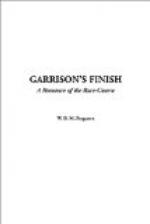“Then—I—was—not—honest?” asked Garrison. He was horribly quiet.
“Emphatic’ly no,” said Crimmins sadly. He shook his head. “And you don’t remember how you came to Dan Crimmins the night you skipped out and you says: ‘Dan, Dan, my only friend, tried and true, I’m broke.’ Just like that you says it. And Dan says, without waitin’ for you to ask; he says: ’Billy, you and me have been pals for fifteen years; pals man and boy. A friend is a friend, and a man who’s broke don’t want sympathy—he needs money. Here’s three thousand dollars—all I’ve got. I was going to buy a home for the old mother, but friendship in need comes before all. It’s yours. Take it. Don’t say a word. Crimmins has a heart, and it’s Dan Crimmins’ way. He may suffer for it, but it’s his way.’ That’s what he says.”
“Go on,” whispered Garrison. His eyes were very wide and vacant.
Crimmins spat carefully, as if to stimulate his imagination.
“No, no, you don’t remember,” he mused sadly. “Now you’re tooting along with the high rollers. But I ain’t kickin’. It’s Crimmins’ way never to give his hand in the dark, but when he does give it—for life, my boy, for life. But I was thinkin’ of the wife and kids you left up in Long Island; left to face the music. Of course I stood their friend as best I could—”
“Then—I’m married?” asked Garrison slowly. He laughed—a laugh that caused the righteous Crimmins to wince. The latter carefully wiped his eyes with a handkerchief that had once been white.
“Boy, boy!” he said, in great agony of mind. “To think you’ve gone and forgot the sacred bond of matrimony! I thought at least you would have remembered that. But I says to your wife, I says: ’Billy will come back. He ain’t the kind to leave you an’ the kids go to the poorhouse, all for the want of a little gumption. He’ll come back and face the charges—”
“What charges?” Garrison did not recognize his own voice.
“Why, poisoning Sis. It’s a jail offense,” exclaimed Crimmins.
“Indeed,” commented Garrison.
Again he laughed and again the righteous Crimmins winced. Garrison’s gray eyes had the glint of sun shining on ice. His mouth looked as it had many a time when he fought neck-and-neck down the stretch, snatching victory by sheer, condensed, bulldog grit. Crimmins knew of old what that mouth portended, and he spoke hurriedly.
“Don’t do anything rash, Bud. Bygones is bygones, and, as the Bible says: ‘Circumstances alters cases,’ and—”
“Then this is how I stand,” cut in Garrison steadily, unheeding the advice. He counted the dishonorable tally on his fingers. “I’m a horse-poisoner, a thief, a welcher. I’ve deserted my wife and family. I owe you—how much?”
“Five thousand,” said Crimmins deprecatingly, adding on the two just to show he had no hard feelings.
“Good,” said Garrison. He bit his knuckles; bit until the blood came. “Good,” he said again. He was silent.




